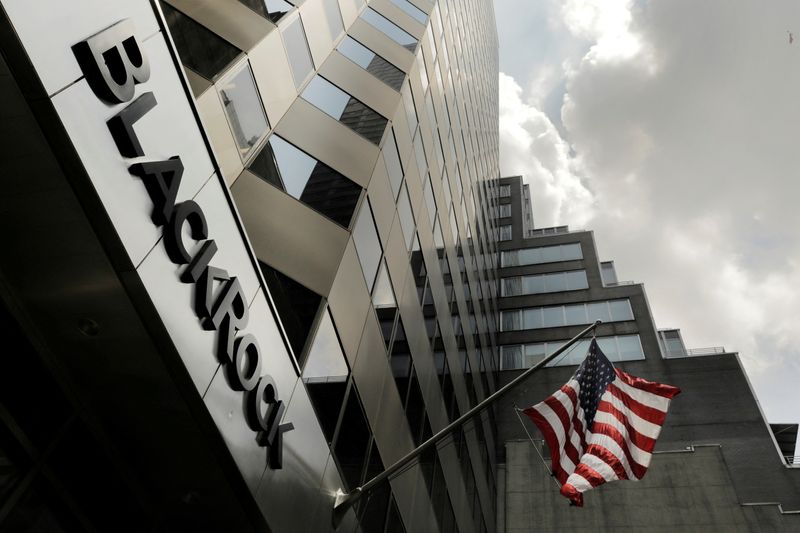By Jaiveer Shekhawat and Davide Barbuscia
(Reuters) - BlackRock Inc (NYSE:BLK) expects dislocations created by a recent banking rout to present "enormous" opportunities to expand its business, as investors shift allocations to avoid abrupt market gyrations and profit from a higher interest rate environment.
The world's largest asset manager reported an 18% drop in first-quarter profit on Friday but beat analysts' estimates as investors continued to pour money into its funds.
The New York-based firm, which makes most of its money from fees on investment advisory and administration services, ended the first quarter with $9.1 trillion in assets under management (AUM), down from $9.57 trillion a year earlier but up from $8.59 trillion in the fourth quarter.
Net inflows in the first three months of the year were at $110 billion, compared with $86 billion a year earlier.
"Recent market volatility and stress in the regional banking sector are the consequences of prolonged periods of aggressive fiscal and monetary policy coming to an end," Larry Fink, chairman and chief executive of BlackRock, said during a conference call.
"I look at the issues that we are seeing today, the market dislocations, as enormous opportunities for BlackRock," he said, adding that the firm was looking to expand its product offerings and improve its use of technology.
Last month, it was reported that BlackRock had been working on a rival bid for Credit Suisse, aiming to counter a plan for UBS Group AG (SIX:UBSG) to acquire the struggling bank, but BlackRock said at the time it had no plans or interest in buying it. Fink said on Friday BlackRock would be prepared for "inorganic and transformational" opportunities to expand its footprint.
Stocks and bonds fluctuated wildly in the first three months of the year as investors switched from expectations of tighter monetary policy to anticipating interest rate cuts following the collapse of two U.S. regional banks in March.
Despite the volatility, markets were up in the first quarter, with the S&P 500 rising over 5%.
"Volatility within the market has led to risk-off positioning, with many investors rotating out of equity products and into safer fixed income and money market mutual funds, which often have lower fees relative to equity funds," said Kyle Sanders, senior equity research analyst at Edward Jones.
"This mix shift has pressured management-fee revenue, which declined nearly 9% from last year," he said.
On an adjusted basis, BlackRock earned $1.2 billion, or $7.93 per share, for the three months ended March 31, compared with $1.46 billion, or $9.52 per share, a year earlier. Analysts had estimated a profit of $7.76 per share, according to Refinitiv IBES data.
Quarterly revenue fell to $4.2 billion from $4.7 billion. The drop was primarily due to "the impact of significantly lower markets and dollar appreciation on average AUM and lower performance fees," BlackRock said in a statement.
BlackRock's shares were up 2.7% at $688.87 on Friday afternoon after the quarterly earnings beat.
"Overall, we view this as a strong start to the year," Goldman Sachs (NYSE:GS) analysts said, pointing to the increase in assets under management and better-than-expected institutional flows.
BlackRock Q1'23 Assets Under Management Falls 5% https://www.reuters.com/graphics/BLACKROCK-RESULTS/lbpggwmylpq/chart.png
Changes in the banking sector after the regional bank turmoil could provide more growth opportunities for BlackRock in areas such as cash management and advisory, they said.
Global investors have been big buyers in money market funds over the past few weeks, benefiting from high interest rates that push deposits out of the banking system.

BlackRock in March saw over $40 billion in net inflows into its cash management strategy, Fink said on Friday, adding that he expected the shift in deposits to money market funds to be a long-term trend.
"Cash is the lifeblood of individuals and organizations, especially in times of stress," he said, with liquidity having become "paramount" for BlackRock's clients.